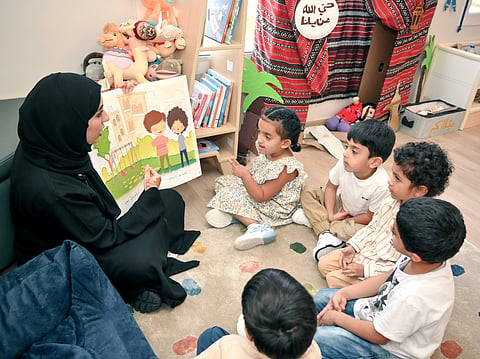4 hours of Arabic a week: Inside Abu Dhabi’s new kindergarten curriculum
Students in all private and charter institutions will receive 240 minutes of lessons

Abu Dhabi: The Abu Dhabi Department of Education and Knowledge (ADEK) has announced a new policy requiring all private and charter kindergarten to deliver 240 minutes of Arabic instruction per week to children in Pre-KG to KG2.
Building identity through language from the earliest years
Beginning in Fall 2025, the new Arabic curriculum aims to strengthen cultural identity and language skills from the earliest years of learning and establish a strong foundation in the mother tongue from the very start.
Structured, age-appropriate Arabic learning in every classroom
Under the new ADEK School KG Arabic Curriculum Policy, all young learners will receive 240 minutes per week of structured, age-appropriate Arabic instruction. This will increase to 300 minutes per week beginning in the 2026/27 academic year.
The new policy ensures that every child, whether a native speaker or learning Arabic for the first time, receives consistent, high-quality instruction during the most critical phase of language development, giving them the opportunity to grow up confident in the language that connects them to their culture, community, and future.
Why is ADEK’s new policy being introduced now?
Research shows that children learn languages best when they’re young and Arabic is not just a subject. In addition, ADEK’s recent survey revealed that while Arabic is widely spoken at home, many children still struggle to use it confidently. This policy aims to bridge that gap, with schools and families working together to keep Arabic alive and thriving.
Storytelling, songs and play to make Arabic come alive
Learning will be engaging and play-based, built around storytelling, songs, and exploration. The policy outlines two tracks: one designed to deepen mother tongue skills for native Arabic speakers, and another tailored for non-native speakers and newcomers. This ensures that each child receives the support they need, regardless of their current language level.
With specially trained teachers, modern materials, and interactive classroom activities, Arabic will become a language students look forward to using every day.
More than just lessons – it’s about identity
“This is about more than just adding Arabic lessons,” said Mariam Al Hallami, Executive Director Early Education. “It’s about giving every child in Abu Dhabi the gift of language, identity, and connection starting from day one. We want Arabic to feel natural, interactive and alive in every classroom and every home.”
This new policy bridges the gap between Arabic learning in nurseries, implemented through ADEK’s Early Education Institutions (EEI) policies, and the start of mandatory Arabic instruction in Cycle 1 in line with Ministry of Education requirements, supporting steady language development during the early years.
Parents to play a key role in supporting Arabic at home
Parents are also a big part of the journey. Schools will share tools and updates so families can join in the fun, whether practicing new words at home, reading stories together, or taking part in Arabic-themed school events.



